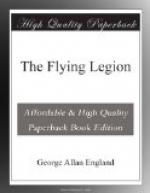Bara Miyan pulled sharply on the red, silver-broidered reins and cut back the frothing lip of his barb. With a slide almost on its haunches, along the soft, golden pavement, the horse came to a quivering stand. All halted. And for a moment, the stamping of the high-nerved horses’ hoofs echoed up along the tall citadel with its latticed windows and its machicolated parapet a hundred and fifty feet in air.
“Well ridden, O Frank! Well ridden by thee and by all thy men of Feringistan!” exclaimed Bara Miyan, with what seemed real friendliness, as he sat there on his high saddle, gravely stroking his beard. “It was a test for thee and thine, to see, by Allah! if the men of the unbelieving nations be also men like us of Araby!
“We of the Empty Abodes are ‘born on horseback.’ But ye, white as the white hand of Musa (Moses) have houses that, so I have heard, move on iron roads. And I see now ye have flying houses. Wherefore horses are not dear to you, as to us. But I see that ye can ride like men. Well done! Salaam!”
The Master returned a “Bikum!” of thanks. He would have been glad to wipe his forehead, streaming with sweat; and so, too, would the others. But pride restrained them. Not for them such weakness as the use of a handkerchief, in presence of these half-hundred grave-eyed, silently observing men of Jannati Shahr.
“Faith, though,” the major whispered to “Captain Alden,” close behind him, “of all ways to take a walk, my favorite way not to is on an Arab horse with a saddle like the Inquisition! Tomorrow, oh, my poor bones, tomorrow!”
Bara Miyan was speaking again, while the Master, Leclair, and his orderly, Lebon—who alone of the Legionaries understood Arabic—listened closely.
“Now that we have eaten salt and are akhawat brethren,” said he, “we must break bread together. Let thyself and all thy men partake of food with us, O Frank! Then we will speak of the present, we shall bestow on thee. Bismillah! Dismount, White Sheik, and enter!”
The Master bowed, and swung himself from his horse. All did the same, Legionaries and Arabs alike. And for a moment they stood there in the sunlight before the long colonnade that occupied the lower story of the citadel; while from beneath that colonnade issued a dozen or fifteen of the black, muscular Maghrabi men, two of whom—in the role of official stranglers—they had already seen. These powerful half-savages took the horses away, the hoofs clacking hollowly on the golden pavement.
Bara Miyan led the way in under the colonnade, which, though of gold like all else in this, wonder city, still offered grateful shade. The perpetual glare of the golden roadways, houses, towers, balconies—even covered as many were with floating curtains of muslin or silk—had been trying to eyes and nerves. Infinitely preferable would stone or wood have been, for dwellings; but as Jannati Shahr was, so the Legion had to take it. And doubtless long generations of familiarity with it had made it wholly normal, pleasant, and innocuous to these super-Arabs.




